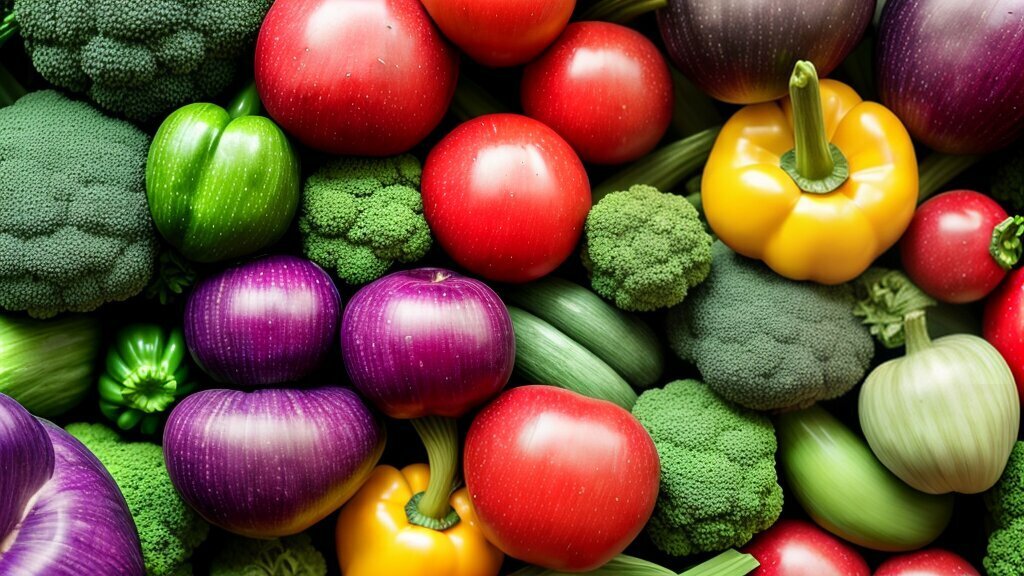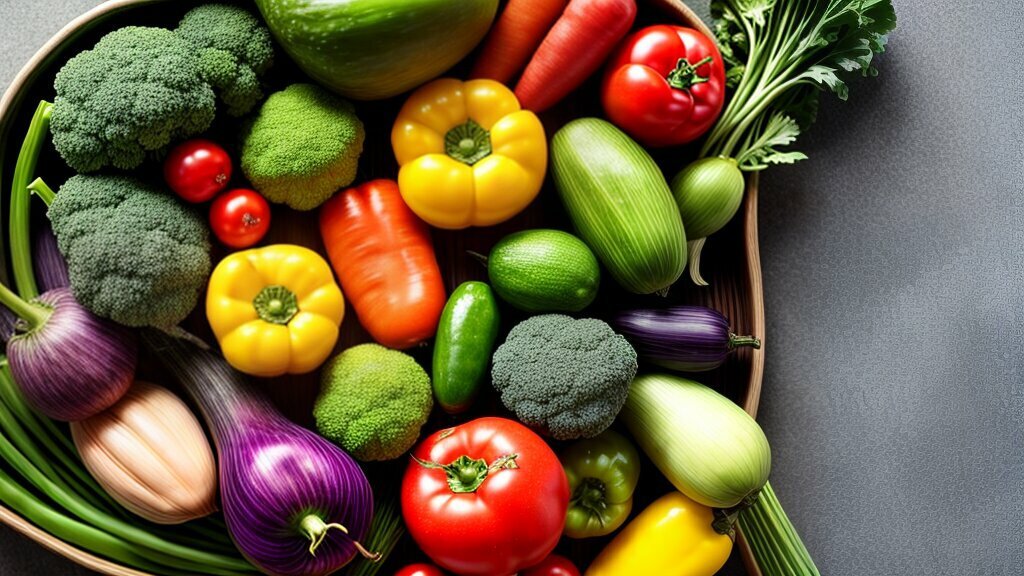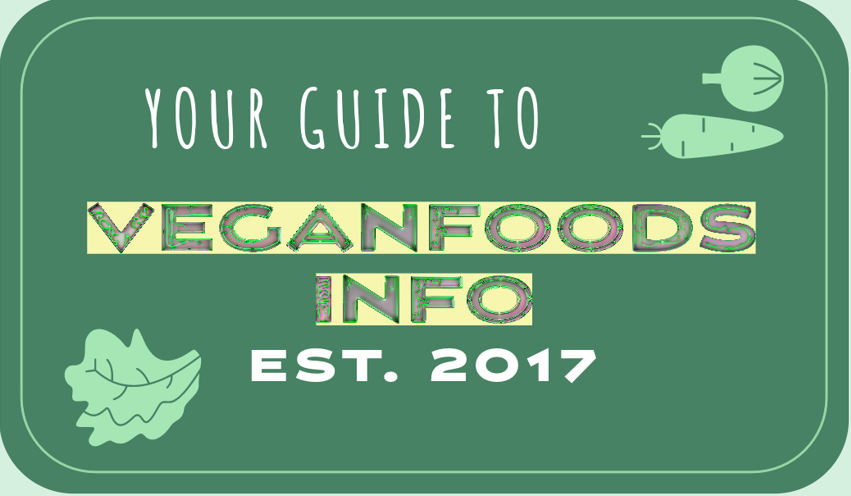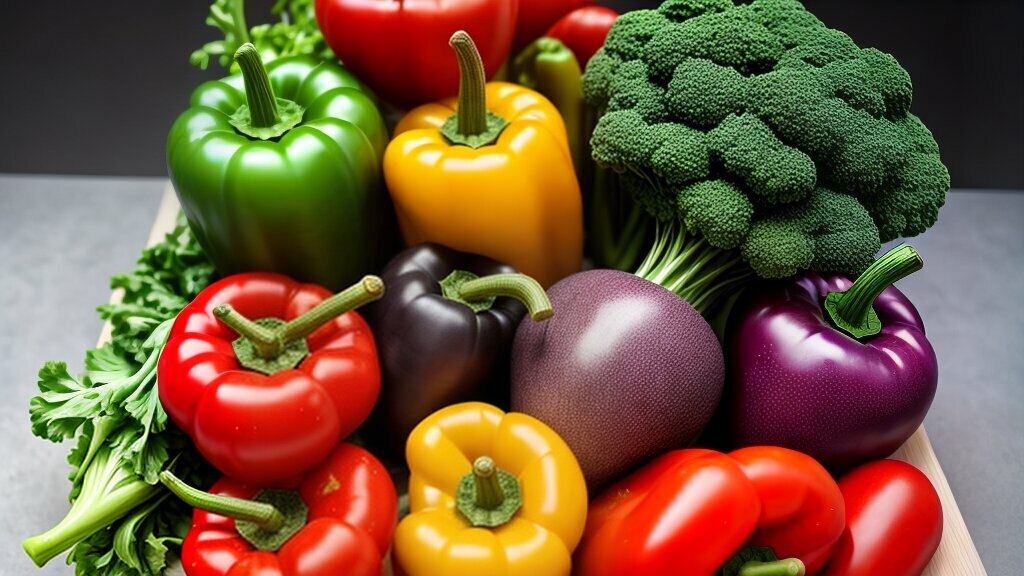Welcome to our guide on organic vegetables! In this article, we will explore the benefits of choosing organic produce, the principles of organic farming, and how you can incorporate organic vegetables into your lifestyle. By the end of this guide, you will have a better understanding of the impact that organic vegetables can have on your health and the environment.
Key Takeaways:
- Organic vegetables offer a range of health benefits, including higher nutrient content and lower pesticide exposure.
- Organic farming principles focus on natural fertilizers and pest control methods to maintain soil health and avoid synthetic chemicals.
- Starting your own organic vegetable garden or utilizing organic vegetable delivery services are great ways to incorporate more organic produce into your diet.
- There is a growing market for organic vegetables and increasing availability in grocery stores and specialty shops, making it easier than ever to embrace the organic vegetable lifestyle.
Understanding Organic Vegetable Farming
Organic vegetable farming is a cultivation technique that prioritizes the health and wellbeing of the environment and the consumers. Unlike conventional farming, which relies heavily on synthetic fertilizers and pesticides, organic vegetable farming focuses on using natural methods to promote soil fertility, prevent pests and diseases, and reduce environmental harm.
One of the key principles of organic farming is maintaining soil health. Organic farmers use compost, manure, and other natural fertilizers to enrich the soil and promote healthy plant growth. This is in contrast to conventional farming, where synthetic fertilizers are often used to boost soil fertility, at the cost of soil health in the long run.
Another crucial aspect of organic farming is pest control. Organic farmers use a variety of natural methods, such as crop rotation, companion planting, and biological pest control. This helps to prevent pests and diseases, and limit the need for synthetic pesticides.
Understanding Organic Certification
Organic farming practices are often regulated by local or national certification programs to ensure the authenticity and quality of organic produce. These programs audit farms and processing facilities to ensure they comply with organic standards. The USDA Organic certification is one of the most widely recognized certification programs in the world.
| Organic Vegetable Farming | Conventional Vegetable Farming |
|---|---|
| Uses only natural fertilizers and pesticides | Uses synthetic fertilizers and pesticides |
| Promotes soil health and biodiversity | May cause soil degradation and harm to wildlife |
| Relies on natural pest control methods | Uses synthetic pesticides to control pests |
Switching to organic vegetables not only benefits your health but also supports sustainable agriculture and promotes environmental conservation.

“Organic farming is not just about growing crops without synthetic chemicals but also about building a self-sustaining ecosystem in the farm.”
By understanding the principles and benefits of organic vegetable farming, you can make an informed decision about the food you consume and the impact it has on the environment.
The Health Benefits of Organic Vegetables
Choosing organic vegetables not only benefits the environment but also provides essential nutrients and other health benefits for your body. Organic vegetables are grown without synthetic pesticides or fertilizers, and are typically richer in antioxidants and other important vitamins and minerals.
Studies have shown that organic vegetables may contain higher levels of nutrients such as vitamin C, iron, and magnesium compared to conventionally grown vegetables. These nutrients are essential for a healthy immune system, proper nerve function, and maintaining healthy bones and teeth.
Another significant health benefit of organic vegetables is reduced exposure to pesticides. Synthetic pesticides have been linked to numerous health problems including cancer, hormone disruption, and developmental delays in children. Choosing organic vegetables can minimize exposure to these harmful pesticides and reduce the risk of these health problems.
In addition to a reduced risk of pesticide exposure, organic vegetables may also have higher levels of flavonoids and other antioxidants. These compounds help to protect the body from free radicals, which can damage cells and contribute to the development of chronic diseases such as heart disease and cancer.
Incorporating organic vegetables into your diet can also help to reduce inflammation in the body, which has been linked to numerous chronic diseases. Organic vegetables have been shown to contain higher levels of anti-inflammatory compounds, which can help to lower inflammation levels and reduce the risk of certain diseases.

Overall, choosing organic vegetables can provide numerous health benefits and contribute to a healthier lifestyle. Not only are they more nutritious, but they also help support sustainable farming practices that benefit the planet. Consider incorporating more organic vegetables into your diet to reap the many health benefits they provide.
Growing Your Own Organic Vegetable Garden
Starting your own organic vegetable garden is a great way to ensure that you have access to fresh and healthy produce year-round. Not only is it a cost-effective option, but it also allows you to control the quality and variety of your vegetables.
Choosing the Right Location
The first step in starting your own organic vegetable garden is choosing the right location. Look for a spot that receives at least six hours of sunlight per day and has well-drained soil. Consider the size of your garden and make sure it can accommodate the vegetables you want to grow.
Soil Preparation
Preparing the soil is crucial for a successful organic vegetable garden. Start by removing any weeds, rocks, or debris. Add compost to the soil to increase its nutrient content and improve its texture. You can also consider adding organic fertilizers, such as bone meal or fish emulsion, to boost soil health.
Seed Selection
Choosing the right seeds is important for a successful organic vegetable garden. Look for seeds that are labeled as organic and non-GMO. Consider the climate in your area and choose vegetables that are suitable for your region.
| Vegetable | Climate |
|---|---|
| Tomatoes | Warm and sunny |
| Carrots | Cool and moist |
| Lettuce | Cool and shaded |
Organic Pest Control
Pest control is a key aspect of organic vegetable gardening. Avoid using synthetic pesticides and instead opt for natural alternatives, such as insecticidal soaps or neem oil. Encourage natural predators, such as ladybugs and praying mantises, to help control pest populations.

Conclusion
Starting your own organic vegetable garden may seem daunting, but with the right preparation and care, it can be a rewarding and sustainable way to produce fresh and healthy produce. By following these tips, you can create a thriving garden that enables you to enjoy the many benefits of organic vegetables.
Convenient Organic Vegetable Delivery Options
Gone are the days when finding organic produce meant making a special trip to a specialty health food store. Today, there are many convenient options for having fresh, organic vegetables delivered right to your doorstep. Whether you’re too busy to make it to the farmer’s market or simply prefer the ease and convenience of having your groceries delivered, organic vegetable delivery services are an excellent option to consider.
One of the most popular options for organic vegetable delivery is a service that works with local farmers to provide a wide variety of seasonal produce. With this type of service, you’ll receive a weekly or bi-weekly delivery of fresh, locally grown vegetables. You’ll get to experience the flavors of each season and support your local farming community at the same time.
Another option is a subscription-based service that delivers organic boxes of vegetables to your door on a regular basis. These services offer a range of box sizes and delivery frequencies, so you can choose a delivery schedule that best fits your needs. Plus, many of these services offer the option to customize your box, so you can choose the vegetables that you and your family love.
Finally, many grocery delivery services now offer organic produce as an option. With these services, you’ll be able to add organic vegetables to your regular grocery order and have them delivered along with your other groceries. This is a great option if you already use a grocery delivery service and want to add organic produce to your order without having to make an additional trip to the store.
No matter which option you choose, having fresh, organic vegetables delivered to your door is a convenient and easy way to enjoy all the health benefits of organic produce without the hassle of shopping for it yourself.

Delicious Organic Vegetable Recipes
Now that you understand the benefits of organic vegetables and how to grow them, it’s time to put them to use in the kitchen! Here are a few delicious organic vegetable recipes to inspire you:
Fresh Tomato and Basil Pasta
This simple yet satisfying pasta dish is a great way to showcase the flavor of fresh, organic tomatoes. Start by cooking your favorite pasta in salted water until al dente. While the pasta cooks, heat some olive oil in a pan and add chopped garlic and red pepper flakes. Once the garlic is fragrant, add chopped fresh tomatoes and cook until they start to break down. Season with salt and pepper, then toss the sauce with the cooked pasta and fresh chopped basil. Serve with grated Parmesan cheese.
Roasted Root Vegetable Salad
This hearty salad is perfect for fall and winter, when root vegetables are in season. Start by preheating your oven to 400°F. Peel and chop a mix of organic root vegetables, such as carrots, sweet potatoes, and beets, into bite-sized pieces. Toss with olive oil, salt, and pepper, then spread in a single layer on a baking sheet. Roast for 30-40 minutes, or until the vegetables are tender and caramelized. Meanwhile, make the dressing by whisking together olive oil, balsamic vinegar, honey, Dijon mustard, and salt. Once the vegetables are done, transfer them to a bowl and toss with the dressing, fresh arugula, and crumbled goat cheese.
Curried Cauliflower Soup
This warming soup is packed with flavor and nutrients. Start by heating some olive oil in a pot and sautéing diced onion and garlic until softened. Add chopped organic cauliflower, chicken or vegetable broth, and your favorite curry powder. Bring to a simmer and cook until the cauliflower is soft. Use a blender or immersion blender to puree the soup until smooth. Stir in some coconut milk and season with salt and pepper. Serve hot, garnished with chopped fresh cilantro.

These are just a few examples of the many delicious organic vegetable recipes you can create. Experiment with different vegetables, herbs, and spices to find your favorite combinations. Happy cooking!
Embracing the Organic Vegetable Lifestyle
The demand for organic vegetables has skyrocketed in recent years as people become more conscious of the impact of their food choices on the environment and their health. Fortunately, there is a growing market for organic vegetables, and the availability of organic options in grocery stores and specialty shops has never been better.
Choosing organic vegetables means choosing sustainable farming practices that prioritize soil health, natural fertilizers, and pest control methods. It also means choosing produce that is free from harmful pesticides and has higher nutrient content, which has been linked to potential disease prevention.
By embracing the organic vegetable lifestyle, you’re contributing to a healthier and more sustainable future. Make a conscious effort to incorporate organic vegetables into your diet, whether that means growing your own garden, signing up for a delivery service, or exploring the options available at your local farmer’s market or grocery store.
FAQ
Q: What are the health benefits of organic vegetables?
A: Organic vegetables have higher nutrient content, lower pesticide exposure, and potential disease prevention.
Q: How can I start my own organic vegetable garden?
A: You can start by choosing the right location, preparing the soil, selecting suitable seeds, and using organic pest control methods.
Q: Are there convenient options for organic vegetable delivery?
A: Yes, there are organic vegetable delivery services that provide the convenience of having organic produce delivered to your doorstep. You can find reliable delivery options by conducting research and reading reviews.
Q: Can you provide some delicious organic vegetable recipes?
A: Certainly! We have a curated selection of delicious and nutritious organic vegetable recipes that you can try. Each recipe comes with step-by-step instructions and highlights the flavors and culinary possibilities offered by organic vegetables.
Q: How can I embrace the organic vegetable lifestyle?
A: You can embrace the organic vegetable lifestyle by making conscious choices to include more organic vegetables in your diet. With the growing market for organic vegetables, you can find them in grocery stores and specialty shops that prioritize sustainable and healthier options.

